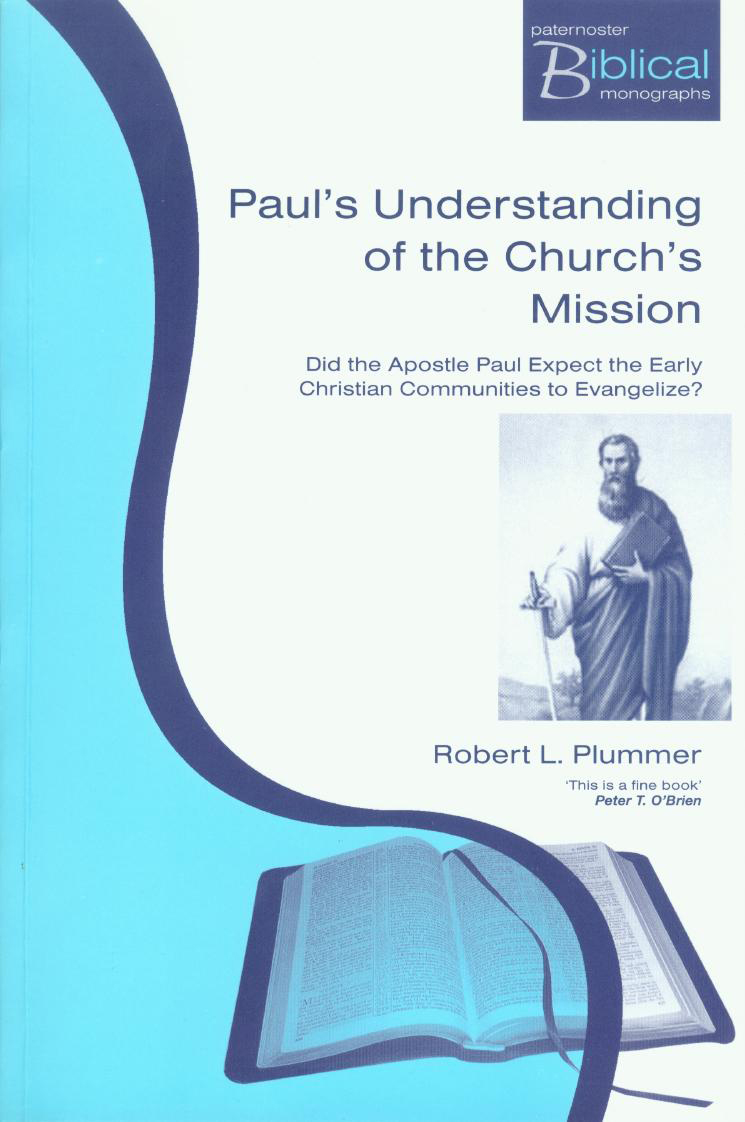
LOUISVILLE, Ky. (BP)–The Apostle Paul was driven by the desire to share the Gospel with all people, and he expected every church to share his passion for evangelism, according to a new book by Southern Baptist Theological Seminary professor Robert L. Plummer.
“Paul envisioned himself as an apostle who conveyed the dynamic gospel to his hearers, so that the same effective, self-diffusing word that characterized Paul’s apostolic mission also characterized the congregations he began,” Plummer writes in “Paul’s Understanding of the Church’s Mission,” published by Paternoster Biblical Monographs.
“As extensions of the apostles’ ministry, the churches are agents of God’s word, which continues to work in and spread through them…. By its very nature, the ‘apostolic church’ must be missionary.”
Plummer’s argument counters several major scholarly books, articles and dissertations that have argued recently that Paul’s letters do not show evidence that he expected ordinary Christians to evangelize. Leading New Testament scholars in the United States, the United Kingdom and Australia have commended Plummer’s book.
According to Paul, Christians should feel compelled to witness because of the dynamic and effective character of the Gospel, writes Plummer, who serves as assistant professor of New Testament interpretation at Southern Seminary.
“The gospel, as God’s word, is ‘power’ which inevitably progresses through the persons and communities included in its advance,” he writes. “As the gospel comes to dwell in the churches, Paul is confident that the word will push the boundaries of the communities to include new people. Ultimately, Paul’s confidence in the gospel to create churches which continue the apostolic mission is a confidence in the gospel’s author and subject — God the Father and the Lord Jesus Christ.”
Paul not only expects believers to witness because of the character of the Gospel itself, but he also gives them specific commands to spread the message of Christ, Plummer writes. Paul’s letters contain both commands to proclaim the Gospel actively and instructions to witness passively through a godly life, he argues.
Biblical texts advocating active evangelism include Philippians 1:12-18 and Ephesians 6:15-17, while the command to witness passively can be found in verses such as Colossians 4:6 and 1 Thessalonians 4:12, Plummer writes.
In addition to examining Paul’s commands to evangelize, Plummer points to “incidental evidence” which demonstrates Paul’s expectation that churches are to spread the Gospel.
“Looking beyond Paul’s explicit imperatives to evangelize, the apostle often makes incidental remarks showing that he expected the gospel to propel the church in missionary activity that paralleled his own apostolic mission,” he writes.
For example, just as Paul prayed for missions and taught God’s truth, he expected the early church to do the same, Plummer writes. These similar expectations for apostles and churches show that Paul viewed a church’s work as an extension of the apostles’ evangelistic work, he argues.
Another factor showing that Paul expected churches to evangelize is his assumption that ordinary believers would suffer for the Gospel just as the apostles suffered, Plummer writes, adding that suffering for the Gospel presumed churches were trumpeting the Gospel.
“An offensive message spreading spontaneously from the people who hold it will inevitably result in opposition and suffering,” he writes. “Given this situation, Paul consistently presents Christians — apostles included — with two options: (1) being ashamed of the gospel, and thus denying the faith … or (2) allowing the gospel to run its dynamic course through their lives and thus suffering for it.”
Plummer concludes that churches which take the writings of Paul seriously have no choice but to devote themselves to proclaiming the Gospel.
“If we understand the New Testament documents as presenting us with the normative pattern for the church, then the modern church must be a missionary church,” Plummer writes. “The church must not only take on the mantle of the apostolic mission in a general or abstract way; she must carry out the apostolic mission in concrete tasks. Just like the ancient churches that Paul addressed, modern churches should be active in proclaiming the gospel.”
–30–














